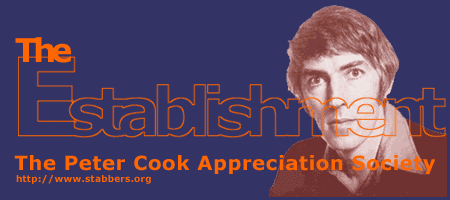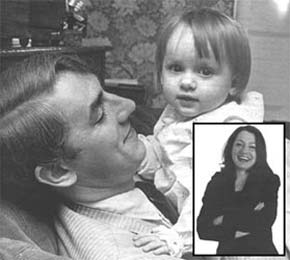|
Daily Mail "Weekend" Saturday 26 May 2001
Daisy Cook is currently exhibiting a collection of abstract landscapes
inspired by her recent trip to Australia.
She admits that, aside from the material her trip gave her to draw
on, she also wanted to retrace the footsteps of her late father,
Peter Cook, who had enjoyed working there with his comedy partner
Dudley Moore. 'Australia made a big impression on him. And I think
he and Dudley made quite an impression on the Aussies,' she says.
'I wanted to visit where he'd been and enjoy the same sense of adventure.'
Peter, inadvertently, has a lot to answer for when it comes to
the success of his daughter's extraordinary artistic talent. It
was his death in 1995 at the age of 57, leaving behind three wives,
two children and thousands of devotees devastated by the waste of
his talent towards the end of his life, which motivated Daisy to
take the plunge and become a full-time artist.
Peter was the comedian, actor and writer who launched the Beyond
The Fringe show while still at Cambridge, co-founded Private Eye
and reduced audiences to helpless laughter with Dudley Moore. At
28, he was referred to as 'the most brilliant product of his generation',
but was later written off as an alcoholic recluse. Yet, appearing
on Clive Anderson's chat show only months before his death, he showed
that his talent was far from diminished.
'His death made me aware of my own mortality,' says Daisy, 'so
I thought I'd better stop wasting time and get on with what I really
wanted to do, which was to be an artist. When Dad died I found it
difficult to come to terms with. It was so hard to see him and Dudley
leaping around on television, knowing he was no longer here. My
dad left such a legacy and a big gap in all our lives.'
Daisy's first solo exhibition was aptly named Bridging The Gap.
Her second, Red Earth, currently showing at London's Stephen Lacey
Gallery, evolved largely from land formations she saw while taking
aerial photographs on her three-month trip to Australia. Her work
is remarkable in its detail. It has been bought by celebrities,
including Geraldine James and Rory Bremner, and commissioned by
Terence Conran. Now she is planning her third show, which draws
from her experience of growing up near Hampstead Heath, north London.
For Daisy, 35, this will mean coming to terms with some idyllic,
yet painful, childhood memories.
Daisy and Lucy were Peter's only children from his first marriage
to Wendy Snowden, an art student he met at Cambridge. They lived
in H.G. Wells's old home where they had hilarious dinner parties
with guests including Peter Sellers and John Cleese. 'When I go
there now, I can't believe that was where I grew up because it's
so beautiful,' says Daisy. 'Lucy and I would while away hours in
the nearby cemetery. We had a little house under the pear tree in
the garden with a ladder to get on to the roof, and little windows
and checked curtains.
'Although our bedroom was at the top of the house, we always knew
when Mum and Dad had visitors and would creep down. Dudley was part
of the family - he was lovely and cuddly. We couldn't say his name
so called him Cuddly Duggly,' says Daisy. 'There were many other
visitors, such as John Lennon and Harold Pinter, but their significance
was lost on us as children.'
Harry Thompson claimed in his 1997 biography of Peter Cook that
a boarding-school education and long separations from his parents,
due to his father's job as a district administrator in Nigeria,
meant that the comedian was undemonstrative, but Daisy disputes
this. 'My abiding memory is of a house full of mirth. There was
always lots of laughter. Dad was really loving, playful and really
knew what kids loved. We sparred off Dad and loved his sense of
humour.'
Sadly, the family unit was shattered when Peter and Wendy divorced
in 1971. Daisy was six. Wendy later took the girls to live in the
family's Majorcan farmhouse, returning to live in Sussex when Daisy
was ten. 'It was deeply traumatic. I would do things like forge
Valentine's cards from Mum to Dad and get them to kiss under the
mistletoe. They both wanted custody of us, but we ended up living
with Mum. At first it was fine because we lived minutes away from
Dad, but then we moved to Sussex.'
Towards the end of his life, Peter descended 'into a protracted
depression and turned to drink. Many say that his black moods and
drinking set in after the divorce separated him from his daughters.
Certainly, shortly afterwards he went for psychoanalysis. Daisy
nods cautiously, adding, 'I think Dad was devastated when we were
no longer around the corner. We were 30 miles away and leading a
completely different existence. I don't know if that made him drink,
but the pain was evident. Dad always had tears in his eyes when
we said our goodbyes.
'Dad's second wife Judy called me "Shoelace" because
when I had to leave Dad after holidays or weekends I would melt
into floods of tears as I was tying my shoelaces. '
Meanwhile, Wendy enrolled Daisy in a Rudolf Steiner school where
she could focus on her art. 'Drawing was my first love. I drew princesses
for all the other girls at my school. Mum is artistic and Dad was,
too. He used to draw lots of bubble captions and funny old men and
hieroglyphics all over the walls of the house. He was an extraordinary
man; complex and sensitive. We understood each other very well.'
After leaving school, Daisy, who has the same lopsided ears as
her father and a deep, raucous laugh, wondered whether to become
an actress or an artist. When she asked her father for advice, he
said: 'Do whatever makes you happy.' What happened in the meantime
was something neither of them could have predicted. Daisy enrolled
at art college in Hastings, but didn't complete the course because
she fell into a deep depression. 'I've no idea why. But I went through
a terribly unhappy period and gave up my art. I disapeared into
myself and was unaware of everything around me. No one could penetrate
my depression - not even Dad, although he tried. He didn't know
what to do, except make me laugh. He was the only one who could
tap into that side of me, although he didn't have any solutions.
'We were an odd couple, Dad and I. Thankfully Mum helped me by
getting me voluntary work in a home for mentally handicapped women.
I worked every day for six months. It helped from day one and each
extra day there was a tangible difference in me.
Instead of going back to art college, Daisy was inspired by her
mother, an enthusiastic cook. She went to French cookery college
to train as a chef, then worked at a haute cuisine restaurant in
Bradford. During this time, Daisy married journalist Simon Hardy
in 1994. She was delighted that her wedding day her mother and father
were together for the first time since their divorce. 'It was fantastic
to see them chortling together like old times.'
When Daisy and her husband moved back to London, she gave up her
job as a chef and began to teach English as a foreign language.
The marriage broke up in 1996 - something which Daisy feels unable
talk about. But by this time she had also done what she refers to
as some 'tentative exploration' with her art. 'I took a studio and
started to paint more, still supporting myself with my teaching.
When Dad died it spurred me on to do more so I could become an artist
just as I'd always secretly wanted.'
'There were a set of circumstances at that time which helped. I
went to a friend's wedding in France and met an art dealer, who
invited me to her gallery. When I showed her slides of my work,
she offered me a show immediately. She didn't know I was Peter Cook's
daughter, which was nice, particularly as Dad used to say: "I
want my daughters to be known for what they do and what they are,
not as Peter Cook's daughters." The show was virtually a sell-out,
which gave me the confidence to give up the teaching.'
Apart from her work, her most treasured possession is a watercolour
her father painted when he was about eight - one of the few items
she inherited from Peter. His second marriage to actress Judy Huxtable
failed and he later married Lin Chong, a property consultant and
investor, who was his companion until he died.
Daisy enthuses about her first stepmother: 'Judy adored us both.
She was playful with a wonderful sense of humour,' but she displays
a diplomatic reticence regarding Lin. 'Grief does the most shocking
things to people and they do things in a way they wouldn't normally
behave. She's an extraordinary lady,' is all Daisy will say. 'It
was hard to get to see my father towards the end. I don't want to
dredge it all up. But the important thing is that I used to see
him alone.'
When Cook collapsed at home he was transferred to the Royal Free
Hospital in Hampstead, before dying of a gastro-intestinal haemorrhage.
Daisy and her sister sneaked in to see him when Lin wasn't there.
'When he was in hospital we lived in the waiting room, so the nurses
would tell us when we could go in and see him - which was when they
knew she wasn't there.'
It was Lin who inherited a large part of Cook's estate. Lucy and
Daisy were left their father's share in the family's Majorcan farmhouse
where they had spent much of their childhood. Sadly, they had to
sell it. 'We couldn't afford the repairs. It was terribly, terribly
sad because we had so many happy family memories there,' she says.
The whole inheritance saga has clearly been long, complicated and
emotionally draining. Daisy will only say: 'Thankfully I've moved
on.'
She is proud of her father's work, right up until the end of his
life. 'I think he still had a lot of work left in him. He was really
excited about different projects. I don't know what the cause of
his drinking was. He kept himself very much together for our visits
and I didn't see too much of him being out of control. That's probably
because we are a proud family and like to keep the problems private.
But at the end of his life I don't think he lost his will nor talent
in terms of being funny. He was also very proud of my work and my
biggest regret is that he didn't live to see my exhibitions.'
Red Earth is on at the Stephen Lacey Gallery,
1 Crawford Passage, Ray Street, London ECl D until June 8.
Tel: 020 7837 5507 for appointments after June 2.
© "Daily Mail Weekend magazine" May 26 2001
Return to >>> The
Spiggott
|


